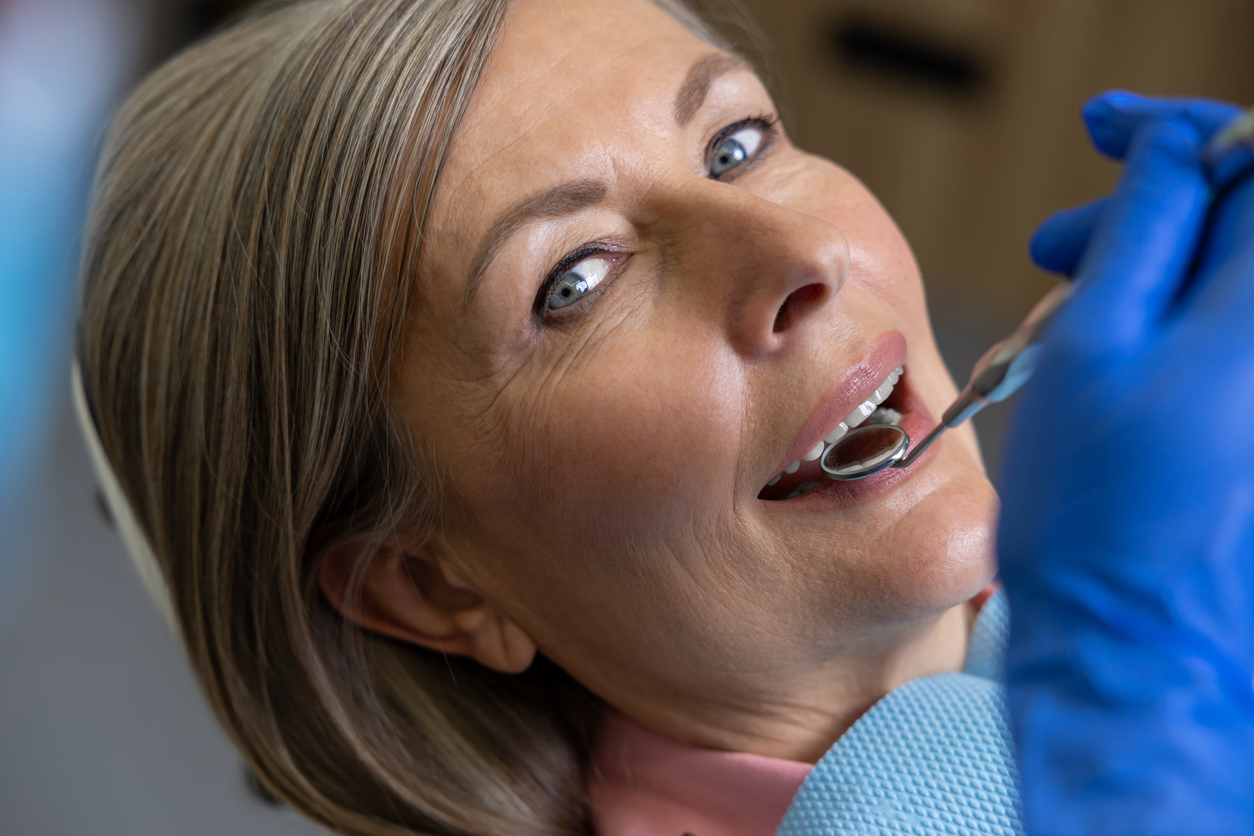
Menopause marks a major milestone in a woman’s life, but its effects go far beyond hot flashes and mood changes. As estrogen levels decline, many women experience surprising changes in their oral health, including increased gum sensitivity, dry mouth, and even heightened risk for periodontal disease. Understanding how menopause impacts your gums can help you take proactive steps to protect your smile.
At Dr. David Scharf’s periodontal office in Long Island, NY, we often see patients experiencing these hormonal shifts and their oral side effects. Here’s what you need to know.
How Menopause Affects Gum Health
1. Estrogen and the Mouth: An Overlooked Connection
Estrogen plays a critical role in maintaining healthy gums. It supports the mucous membranes in your mouth and regulates blood flow to the soft tissues. When estrogen levels drop during menopause, these tissues may become thin, inflamed, and more prone to bleeding.
This can lead to:
- Red, swollen, or tender gums
- Increased bleeding during brushing or flossing
- Gum recession or the appearance of longer teeth
If left unchecked, these symptoms can progress to periodontitis, a serious gum infection that damages the soft tissue and bone supporting your teeth.
2. Dry Mouth (Xerostomia)
Another common complaint during menopause is dry mouth, caused by reduced saliva production. Saliva is essential for washing away food particles, neutralizing acids, and protecting your teeth from decay. A persistently dry mouth can lead to:
- Tooth decay
- Bad breath
- Mouth sores
- Increased plaque buildup
3. Burning Mouth Syndrome
Some menopausal women report a burning sensation in the mouth, tongue, or lips, often described as a scalded feeling. Though the exact cause is not fully understood, hormonal imbalances are a likely contributor. This condition can also interfere with taste and make eating uncomfortable.
What You Can Do: Oral Health Tips During Menopause
Prioritize Regular Dental Checkups
Scheduling regular visits with your dentist or periodontist is crucial during and after menopause. Early detection of gum disease means easier, more effective treatment. At Dr. Scharf’s office, we provide comprehensive periodontal exams to monitor your gum health and bone levels.
Improve Your Oral Hygiene Routine
Now is the time to double down on daily care:
- Brush twice daily with a soft-bristled toothbrush
- Use fluoride toothpaste
- Floss every day to remove plaque between teeth
- Consider using an antibacterial mouth rinse to reduce inflammation
Stay Hydrated and Stimulate Saliva
Combat dry mouth by:
- Drinking plenty of water throughout the day
- Chewing sugar-free gum or sucking on sugar-free lozenges
- Avoiding alcohol and caffeine, which can worsen dryness
Talk to Your Healthcare Provider
Hormone replacement therapy (HRT) may help mitigate some oral symptoms, but it’s not for everyone. Speak with your doctor to understand your options and how they may impact your gums and overall health.
When to See a Periodontist
If you notice persistent bleeding, gum recession, loose teeth, or changes in how your teeth fit together, it’s time to see a specialist. As a board-certified periodontist in Long Island, NY, Dr. Scharf has extensive experience treating menopausal women with customized periodontal care plans.
We offer non-surgical periodontal therapies, laser gum treatment, and dental implants for patients experiencing tooth loss due to gum disease.
Protect Your Smile Through Every Life Stage
Menopause is a natural part of aging, but it doesn’t have to compromise your oral health. By staying informed and proactive, you can maintain healthy gums and teeth well into your later years.
If you’re in the Long Island, NY area and concerned about changes in your gum health, contact Dr. David Scharf’s office today to schedule a consultation. Let’s work together to keep your smile strong and confident through every stage of life.

